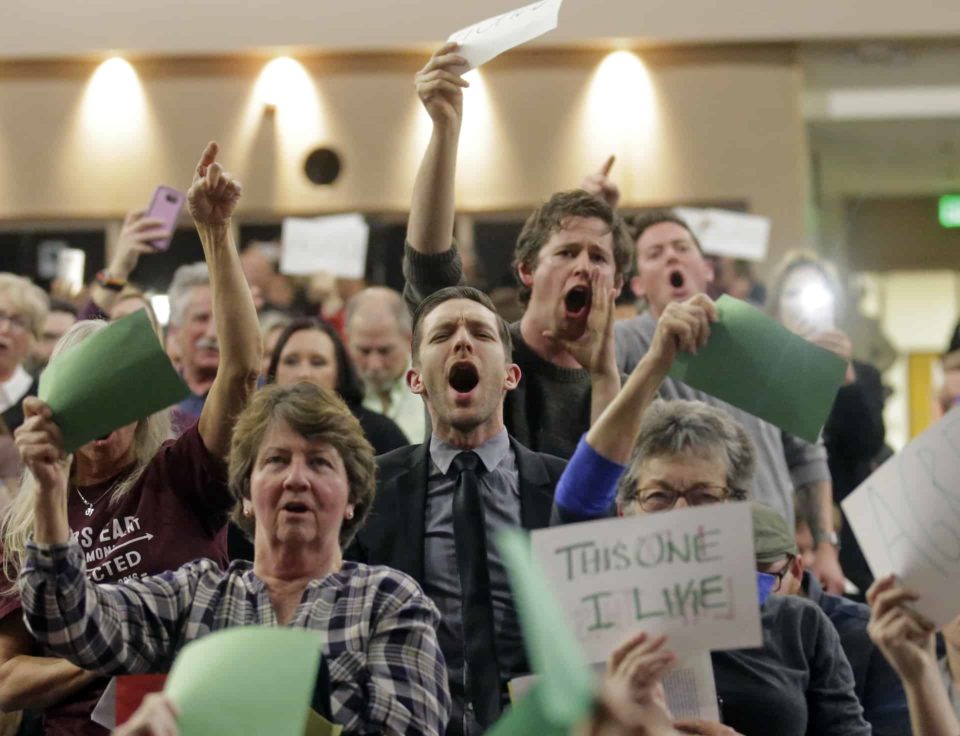
Members of Congress begin a two-week “working” recess Saturday after three months of unrequited efforts to repeal Obamacare, fights over President Trump’s Supreme Court nominee that ended with Republicans changing centuries-old Senate precedent, and nonstop Russian conspiracy chatter. At home, however, it may be even more rancorous.
Buoyed by the wall-to-wall organizing of over 300 events with more than 100,000 people during the one-week February recess that helped stop Trumpcare, progressive groups calling themselves the “Resistance” have been planning for weeks to try and put their foot on the gas this recess with more town halls, protests, impromptu office visits, and rallies planned for Democrats and Republicans alike.
But the resistance groups also might be victims of their own early success. Trump’s health care plans are now stalled for the foreseeable future and his other big initiatives on tax reform and infrastructure are at least several months away. Without a clear agenda from Trump right now, many activists see this recess as a test of whether they can propel the momentum gained in the first few months of Trump’s presidency without an obvious rallying point.
“We can’t let this become ‘Remember those two weeks we were into activism,’” Indivisible co-founder Ezra Levin warned organizers on a web livestream for Indivisible members this week.
Leading organizers of the anti-Trump movement told VICE News that their tactics will largely be the same as the last recess with a focus on getting the attention of members of Congress and the media through town halls or office visits. They see themselves as grafting steel to the spines of squishy Democrats, showing appreciation for Democrats who fight and obstruct, and verbally pummeling Republicans who acquiesce to Trump out of party loyalty. They will also shame Democratic and Republicans members of congress like Republican Sen. Pat Toomey of Pennsylvania who have been avoiding in-person town halls while opting for the more controlled tele-town halls.
But the groups don’t expect one issue to dominate the discussion in the way health care did last time. “In general, the theme is about demonstrating we aren’t going away,” Brian Stewart, the media direct for MoveOn which recently launched Resistance Recess, said.
Over the last several weeks, the various progressive groups have also been shoring up their organizations after the initially overwhelming groundswell of energy. Freshly updated websites, more staff, better offices, public and shareable calendars, and built out email lists are all steps to try to patch up the sometimes leaky bucket holding the grassroots fervor.
But the largest groups such as Indivisible, Working Families Party, MoveOn, Organizing for Action (OFA), and Our Revolution are circumspect about predicting if they will be as disruptive as they were in February. So far, the total number of scheduled events is lagging or just barely matching the number of events during the February recess despite being twice as long.
There is significant overlap among the groups so it is impossible to get an exact number but there are around 250-300 town halls, demonstrations in front of congressional offices, strategizing meetings, and marches scheduled. Resistance outfits stress that events are being added to their schedules daily and could easily exceed February’s turnout but they just don’t know yet if the number of people and energy will match that first period.
Without a signature Trump legislative initiative to resist, the hallmark event of the recess, according to organizers, will be the approximately 150 Tax Day marches across the country on April 15th calling for Trump to release his tax returns. The New York City march will have blown-up chicken balloons in an insinuation of cowardliness, a marching band, and some B-list star power in House of Cards creator Beau Willimon who has been active in organizing against Trump.
Trump’s elusive tax returns have emerged as a Holy Grail for some liberals in recent months, convinced the documents will expose potentially damning ties to Russia. Republican Rep. Markwayne Mullin of Oklahoma got so tired of the Russia questions at an April 1 town hall that he said, “I’m not even going to entertain that question, so now, the next 22 meetings I have, I’m just going to tell y’all to sit down.”
Resistance leaders told VICE News they expect there to be a lot of questions on the Russia investigation over the recess. “Russia comes up at every event and comes up a ton,” Sarah Dohl, another co-founder of Indivisible, said.
Other groups are trying to rally people around an alternative agenda after coming together in opposition to Trump’s. Our Revolution, a spin-off of Sen. Bernie Sanders’ presidential campaign, is supporting fifty-plus rallies around the country Saturday April 8 calling for a Medicare for All single-payer health care plan.
It’s unclear if lingering questions about Trump’s Russia connections or his still-unreleased tax forms will be as galvanizing an issue as opposing Trumpcare was during February recess. It’s a hard-learned rule in politics that it’s easier to unite people against something than it is to organize people for a specific alternative.
But the “Resistance” leaders hope that Trumpcare could be just the beginning of something bigger rather than the end. “This is part of a sustained movement that will include constituents unseating elected officials who refuse to represent them and stand with Trump’s dangerous agenda instead,” Stewart said.
3 WAYS TO SHOW YOUR SUPPORT
- Log in to post comments












